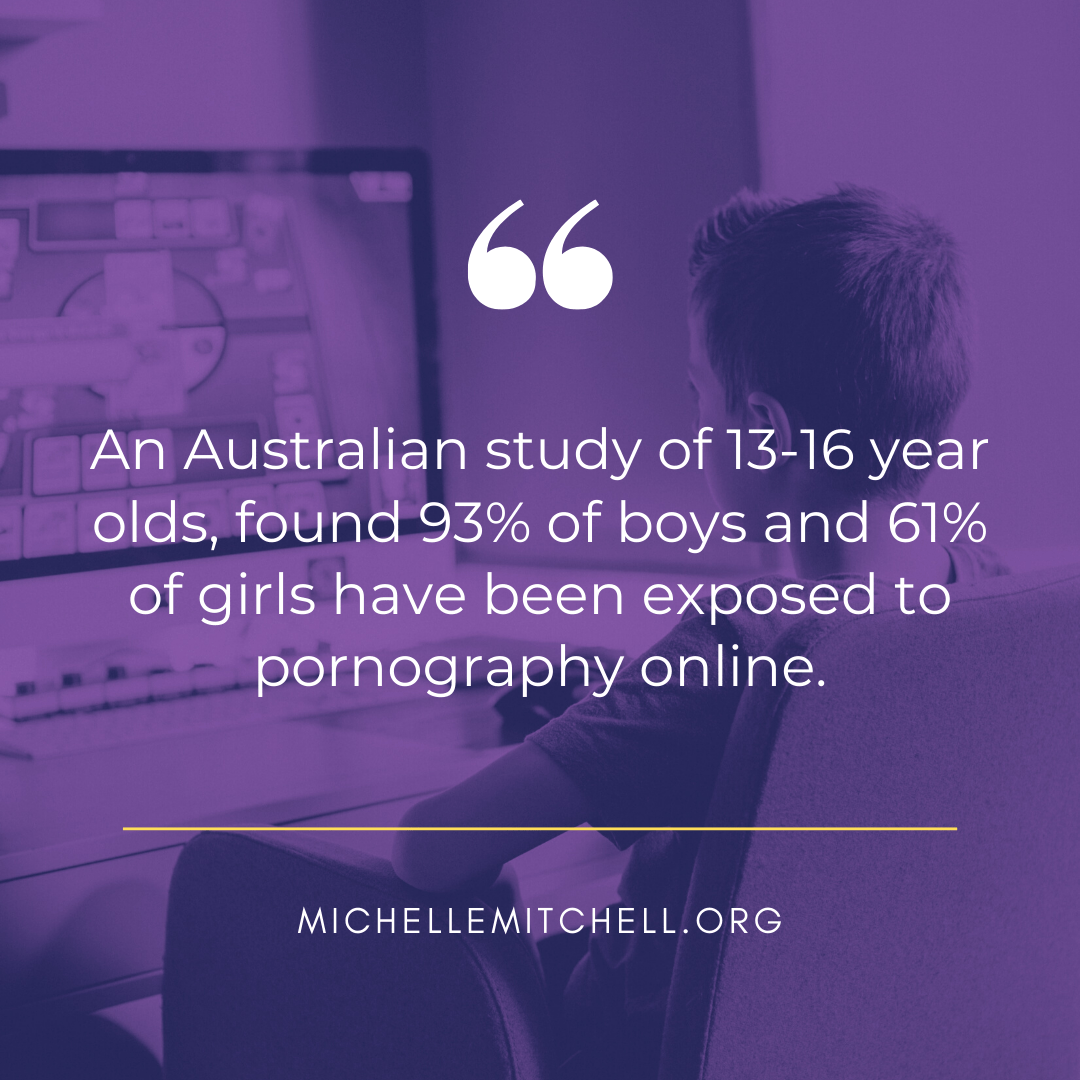michelle's blog
Responding to Pornography Exposure: A Guide for Concerned Parents
read

I find that all parents have a different response to statistics about pornography exposure, depending on their current experience. Some parents will shed a tear because those numbers represent their child, others will nod furiously because they child’s friend has been exposed and others will simply go very quiet — this is NOT what we signed up for!
Current research tells us:
- The average age of first exposure to pornography in Australia is decreasing and anecdotally being reported as 8 years of age.
- An Australian study of 13-16 year olds, found 93% of boys and 61% of girls have been exposed to pornography online.
- A New Zealand study found 1 in 4 young people first saw pornography before 12 years of age. 71% of young people were not seeking out the pornography when they first saw it.
- 75% of boys and 67% of girls aged 7-11 years of age in treatment for Problem Sexualised Behaviours (Harmful Sexual Behaviours) reported early sexualisation through online pornography.

Supporting families whose kids have been exposed to pornography has been a great privilege really throughout my career. My role has mostly been as a first responder, to help parents remain level headed and gather a ‘next step’ plan – which may come in the form of a framing a high-quality conversation or accessing professional support.
Here are the top four questions parents ask me:
- Should I be feeling this sad?
- How could I not have known?
- What did I do wrong?
- Is this going to affect them for life?
- What do I do now?
- What other resources do you recommend?
Should I be feeling this sad?
It is completely normal to feel shock, disappointment, personal guilt, anxiety and grief. One of the biggest challenges you will have is processing these feelings away from your child. If you need to independently seek professional counselling, do so.
How could I not have known?
Simply put, you don’t see what you aren’t looking for. There are so many assumptions that guide what we ‘see’ or ‘don’t see’ in our young people’s lives. You might have assumed your child could be trusted. You might have assumed they knew better. You might have assumed that pornography was a male issue and wouldn’t reach your daughter. Our assumptions guide our parenting decisions. When we know better, we do better.
What did I do wrong?
A part of a parent’s responsibility is to protect their children so it is understandable that parents feel responsible when things go wrong. However, when it comes to the internet there is so much that parents can’t control. We can’t eliminate the risk altogether, or change the past.
How you respond now is far more critical that what has happened. The more time you spend in regret and guilt the less time you will spend productively engaging as a parent today. Parents tell me that their biggest challenge is regaining their confidence, and not blaming themselves.
Is this going to affect them for life?
Many parents who discover their children or teenagers are regularly accessing pornography say, “My child or teenager has a pornography addiction.” These are strong words. Remember that their brain is impressionable yet mouldable. Nothing is set in concrete. What is a habit now, can be reversed.
More than anything, our children need to be empowered and educated to make wise choices. Exposure to pornography can be an important learning curve for any child. I often explain to parents, “It is not if your child will see pornography, it is what they you do when they do see it that will make all the different.” Unfortunately 84% of boys, and 63% of girls see pornography before they leave high school.
What do I do now?
If it’s an isolated incident which resolves quickly, there may be no need to make more of it than that. But if it continues, please get some professional help. This is one issue I plea with parents not to try and deal with ‘in house’. Pornography addictions find a permanent residence in shame, guilt, lies and hiding. They have far reaching affects on relationships, because they aren’t just about pornography. The issues is far broader than that.
What Other Resources Do You Recommend?
You may also need to review how you are managing your tween or teens online time, and set up a new set of boundaries and software. To help here are a few resources for you to consider:
For options regarding safety software, check out:
Our Pact
Family Zone
K9
Nanny Net
For ongoing support and tips, you might want to follow these Facebook pages:
Susan McClean
The Cyber Safety Lady
Common Sense Media
Safe on Social
Dr Kirsty Goodwin
RECOMMENDED READING: Content from this Blog is from Michelle’s book ‘Parenting Teenage Girls’ in the Age of a New Normal‘
RECOMMENDED WEBINAR: Talking Tech with Teens and Tweens
nEW here?
If you are new to my blog, I’m guessing that someone you trust mentioned my name, or you stumbled upon me online. This site is full of helpful parenting ideas that will help you make decisions with more confidence.
If you have something specific you are looking for, why not search the topics below. If you just want to browse, why not start by reading my most popular posts.
If you would like to receive Michelle’s blog via email each month, simply sign up below, indicating if you are a parent or a professional.

top reads
- 1. Try Being 5 Minutes Late: Common Sense Ideas to Promote Resilience
- 2. How to Deal with an Entitled Teen: Strategies You Can Use Today
- 3. Choosing a Counsellor: Ideas That Could Make All the Difference
- 4. Even If: Conversations to Combat Anxiety
- 5. What to Say if Your Child is Self-Harming: A Guide to the Initial Discussion